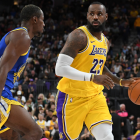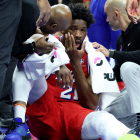
After a Hall-of-Fame 13-year run that resulted in four championships, five All-Star selections and six Finals appearances, Klay Thompson has left the Golden State Warriors to join the Dallas Mavericks on a reported three-year, $50 million contract.
The departure of a franchise icon brings to a close what became a relatively rocky separation. After tearing his ACL and Achilles tendon in consecutive summers, Thompson hasn't been the same player since, even after playing a key role in the Warriors winning the 2022 title in his first season back.
Thompson was, at that point, in the third season of a five-year, $189 million contract that Golden State had signed him to, knowing he would miss the entire 2019-20 season. The Warriors didn't know he would miss the next season, too. They wound up paying him in the ballpark of $70M over two seasons in which he did not play a single game.
Over the last three years, Thompson watched the Warriors sign Jordan Poole to a $123M extension and Draymond Green to a four-year, $100M deal last summer. It was reported prior to this past season that a two-year, $48M extension was offered to Thompson, though The Athletic's Anthony Slater indicated that [the Warriors and Thompson] have differing versions of the firmness of the offer and, again, the true desire of the franchise's lead decision-makers in valuing him as a can't-lose member of the core."
That last part is the key. Thompson, who ultimately didn't sign any extension last preseason, entered this summer as a free agent. He came off a season in which he was, at different points, removed from both starting and closing lineups, and increasingly came to question management's "true desire" to bring him back.
That, according to Slater, is why Thompson asked Stephen Curry not use his superstar sway to pressure management into retaining his splash brother. From Slater:
It's been a layered five-year path to this divorce, splintering last season, sprouting earlier and finalizing in the last couple weeks, where —among the conversations Thompson had, league sources said — was a request of Stephen Curry not to exert his significant organizational influence and up the temperature with management to ensure Thompson's return. Curry's measured voice, even if it altered the outcome, wouldn't change the genuineness of Joe Lacob and the front office's true desire to have Thompson back.
This is understandable by Thompson. It's a pride thing. After all he has given to the Warriors in the building of a basketball dynasty that has resulted in what has been reported as a nearly $8 billion team valuation, he desired to be wanted back on the strength of his own merit. He wanted it to be off his own value both past and present, rather than as some sort of glorified gift from the front office to Curry.
The answer to all this is likely somewhere in the middle. The Warriors valued Thompson, just not as much as he desired. They would've loved to have him back on their terms, but not on his. According to Slater, Thompson's decision to leave "became easy when the Warriors kicked him down the summer pecking order."
The Warriors were going to get below the luxury-tax line, first and foremost, and they eventually made their run at trading for Paul George. The message, at least the way Thompson heard it, was that they would deal with him after more important matters.
Thompson didn't wait around. He wanted to be a priority and Golden State just wasn't in a position to treat him as such. That's the harsh reality of big-time basketball business. He's not the player he used to be. He was, instead, handled with a lacking urgency that reflected the player he has become. Tough business, but business nonetheless. Hopefully one day Thompson will come to understand that.

















